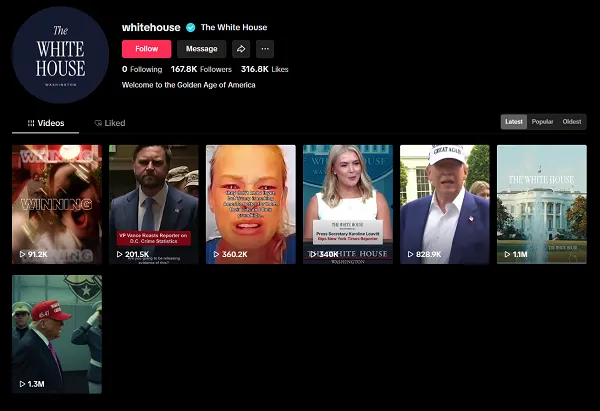Beijing Refuses to Hand Over TikTok’s Secret Algorithm
 Adshine.pro08/21/202516 views
Adshine.pro08/21/202516 viewsIt’s now been more than 200 days since the U.S. Senate-backed TikTok sell-off law officially came into effect, and the situation remains highly uncertain.
The Chinese government has once again made it clear that TikTok’s recommendation engine — the powerful algorithm behind the app’s popularity — is not up for sale as part of any potential U.S. partnership.
In a statement published via the state-run outlet China Daily, Beijing criticized Washington’s approach, pointing out that the recent launch of an official White House TikTok account runs counter to the very arguments laid out in the divestiture legislation, and undermines the idea that the platform represents a pressing national security threat.
The White House formally launched its TikTok profile on Monday and has already begun posting content, sparking anger in Beijing.

As China Daily put it:
“The White House creating its own TikTok account directly contradicts the so-called ‘national security threat’ narrative, which asserts that ByteDance is controlled by the Chinese government and that the app could be weaponized to influence Americans.”
That’s not entirely accurate — the presence of a White House account on TikTok doesn’t eliminate the broader risks around influence operations or data collection. But it does create a perception of double standards, which Chinese officials have been quick to seize upon.
Beijing also highlighted other examples of what it calls unfair treatment of Chinese companies in the U.S.
“Electronics firms Huawei and ZTE, as well as enterprises connected to shipbuilding and port infrastructure, have faced baseless accusations. DJI, the Chinese drone maker, was blacklisted and later removed, largely because U.S. clients could not source adequate alternatives.”
Again, much of this is framed from a Chinese perspective. The larger U.S. concern with TikTok is twofold: the vast amount of user data it collects, and its ability to potentially amplify state-approved messaging that could shape public opinion. The Trump campaign, and now the White House itself, may see TikTok as a valuable distribution channel to reach younger voters, but that doesn’t erase the structural risks the app poses.
Ultimately, the CCP has used this moment to reaffirm its long-standing position: TikTok will not be sold with its core algorithm.
“As spokespeople for China’s commerce and foreign ministries have repeatedly emphasized, business operations and acquisitions should follow market principles and be determined independently by the companies involved. If Chinese enterprises are in play, they must comply with Chinese law. Importantly, China has already released a catalogue of restricted technologies, which explicitly prohibits exporting sensitive systems such as short-form video recommendation algorithms. This sets a clear boundary for any TikTok deal.”
That red line — the refusal to hand over TikTok’s underlying technology — has always been central to the deadlock. Without the algorithm, any U.S. acquisition would be buying only the brand and front-end platform, stripped of the very mechanism that makes TikTok so effective.
Potential buyers have been reluctant to move forward without that piece of the puzzle. Some speculative proposals have floated the idea of building a U.S.-only TikTok version with a weaker algorithm derived from the original, though the company itself insists this is not under consideration.
But the reality is that TikTok’s magnetic pull comes from its ability to rapidly learn individual user preferences and fine-tune the feed on the fly. Its recommendation engine relies on incredibly detailed recognition of elements within each video, and then cross-matches them against engagement signals from billions of global interactions. TikTok appears to have mastered this far better than its competitors, including Meta.
Keeping those methods under wraps is a logical move for both commercial and political reasons. Beyond the trade advantage, it’s likely the system also incorporates identifiers that could raise privacy or ethical concerns if subjected to outside scrutiny.
All of which explains why China is holding firm — and why this standoff could result in TikTok’s removal from the U.S. market altogether.
Just last month, U.S. Commerce Secretary Howard Lutnick reiterated that if no acceptable sale is finalized by the September 17 deadline, the government will move to enforce a complete ban of TikTok in the U.S.
That sets the stage for a high-stakes showdown, with both sides appearing unwilling to compromise as the clock ticks down.
📢 If you're interested in Facebook Ads Account, don't hesitate to connect with us!
🔹 https://linktr.ee/Adshinepro
💬 We're always ready to assist you!